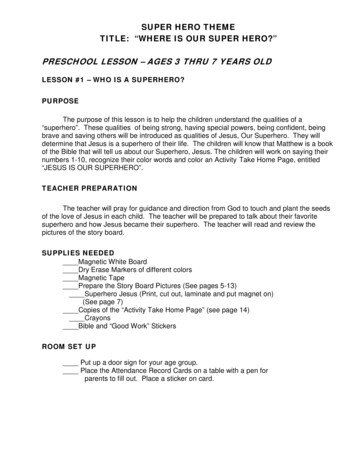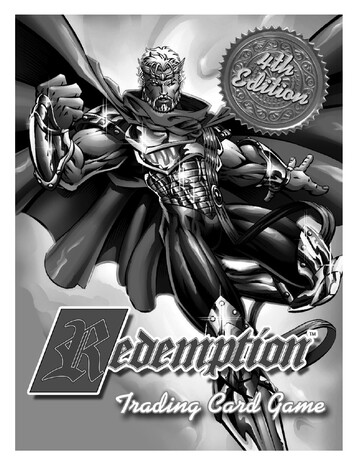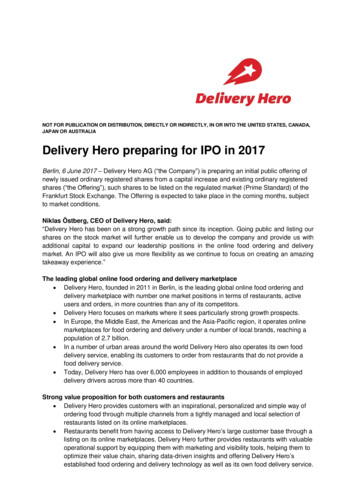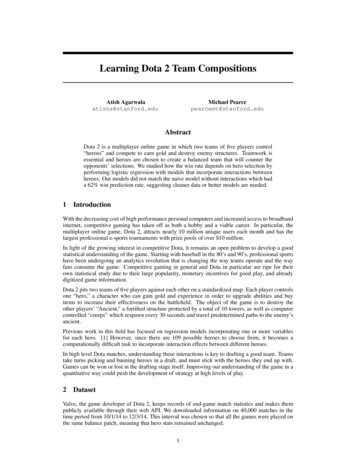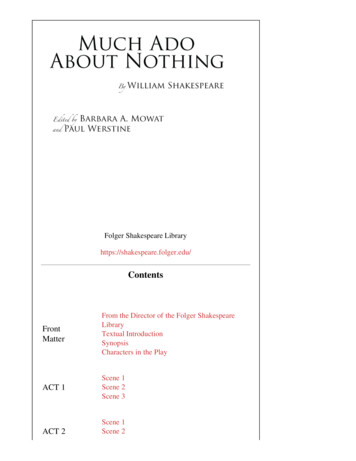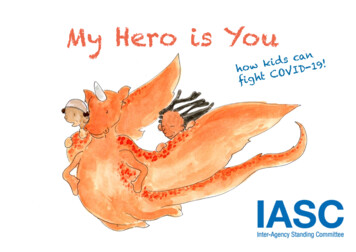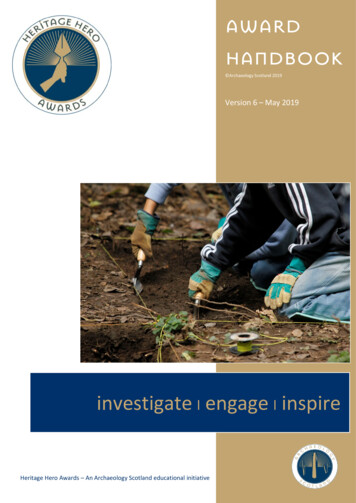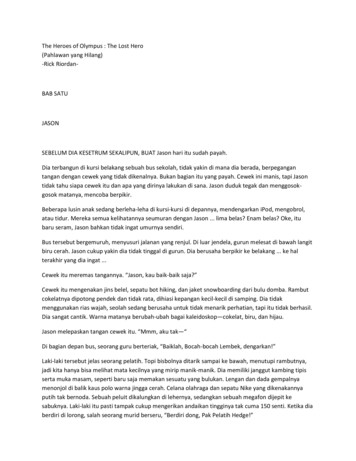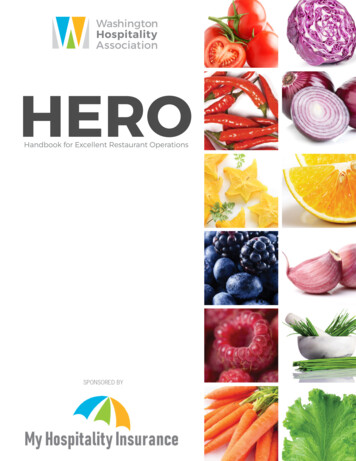
Transcription
HEROHandbook for Excellent Restaurant OperationsSPONSORED BYPage 1
HEROHandbook for Excellent Restaurant OperationsYour guide to restaurant operations in Washington stateCopyright 2020, Washington Hospitality AssociationSPONSORED BYPage 2
ContentsAbout the HERO Manual.7Government Affairs.8LAWS & REGULATIONSBusiness & Occupation Tax.9Collecting Sales Tax.10Collecting Sales Tax.11Paying Sales Tax.12Local Sales/Use Tax.13Bakery Items.14Banquet Room Rental.15Caterers and Catering.16Coupons, Gift Certificates and Free Meals.17Cover Charges.18Delicatessens.19Delicatessens.20Employee Meals.21Espresso Stands.22Games, Gambling and Similar Income.24Gratuities (Tips).25Including Sales Tax in the Price.26Pizza.27Syrup Tax Credit.28Unclaimed Property.29Vending Machines.30Leasehold Excise Tax.31Litter Tax.32Personal Property Tax.33Record Keeping Requirements.34Preparing for an Audit.36Breastfeeding.37Pregnancy Accommodation.39Religious Accommodation.40Service Charges.42Credit Cards – EMV.47ADA Compliant Websites.48What are the legally binding requirements for websites?.49Cash Overages and Shortages.50Corkage Fees.51LAWS & REGULATIONS: TIPSSummary of Tip Laws.52Tip Rate Determination and Education Program.55Tip Pooling.57LAWS & REGULATIONS: EMPLOYMENTNew Hire Reporting.59Pay Equity & Salary History.60Employee Work Authorization Verification.61Minimum Wage.64Page 3
Paid Sick Leave.65Employee Paid Sick Leave Notification.78Paid Family and Medical Leave.79Affordable Care Act Notification Requirements.81Affordable Care Act Reporting Requirements.82Meals and Breaks.84“Show Up” Pay.86Hourly and Salaried Overtime.87Payroll Deductions.89Employee Apparel.90Terminating an Employee.91Prohibited Duties for Minors.93Preventing Teen Injuries.95Using Teen Labor.96More Favorable Laws.98Personal Chefs.99LAWS & REGULATIONS: HEALTH & SAFETYWashington State Retail Food Code.100CBDs in Food and Beverages.101First Aid Compliance.102Person in Charge (PIC).103Consumer Advisory.105Sick Worker Restriction and Exclusion.107Hand Washing.109Cooking Temperature Guidelines.111Cooling Temperature Guidelines.112Time As a Control.113Temperature Danger Zone.114Food Trucks & Trailers.115Hazard Communication Rule.118Workers’ Compensation.126Workplace Violence.142LAWS & REGULATIONS: LIQUOR & MISC.Surveillance Cameras Employee Acknowledgment.143Verifying Identification.144Signs of Intoxication.146Preventing Intoxication.148For All Licensees.149Retail Liquor Advertising.150Required Signage.151Protecting Your License.152Retail/Non-Retail Relationships.153Financial Interest & Ownership.154Penalties.155Keg Sales.156Private Compliance Checks.157Spirits, Beer and Wine.158What You Can Sell.160Tavern License.161Sports/Entertainment, Nonprofit.162Lodging.163Page 4
Caterer’s Endorsement.164Caterer’s License.165Mandatory Alcohol Server Training.166Enforcement Offices.167Playing Music in Your Business.168Service Animals.170Cigarettes & Vaping Products.173TRAININGEducation Foundation.174 ServSafe Alcohol.175 ServSafe Allergens.176ServSafe Manager.177 Training Youth – ProStart . 178Mentor Worksites.179SPEAK OUTEmployer Resources Northwest – Workers’ Compensation.180Is Your Restaurant Successful?.181Handing Down the Family Business.183Easily Increase Profitability.185Employee Turnover.186How to Sell Your Restaurant.189Immunizations.190Control Unemployment Costs.191Gluten-Free.192Renegotiate Your Lease.194Make the Most of Menu Planning.195Become a Better Manager.196Increasing Bar Revenues.197Bolstering Lunch Sales.199Oily Rags Fire Hazard.204Fire Prevention 101.205FORMSApplication for Employment.209Sample Job Description – Sous Chef/Kitchen Manager.213Sample Job Description – Line Cook.215Sample Job Description – Server.215Sample Job Description – Busser.217Sample Job Description – Dishwasher.218Sample Job Description – Bartender.219Sample Job Description – Host/Hostess.220New Hire Form Checklist.221New Hire/Change in Status Form.222Sample Interview Questions.223Telephone Reference Check Form.224New Employee Safety Orientation Training Checklist.225Sample Employee Uniform Agreement.226Employee Handbook Acknowledgement Form.227Sample Employee Health Policy.228Employee Overtime Authorization.229Tardy Notice.230Absentee Notice.231Page 5
Warning Notice.232Employee Termination Notice.233Employee Termination Record.234Employee Performance Review.235Employee Information .235Employee Exit Interview.239Manager Evaluation by Employee.240Handwashing Chart (Morning) .241Handwashing Chart (Evening).242Restroom Check List.243Washington Hospitality Association Secret Shopper Form.244First Aid Response Plan.247Cooling Down Food Tracking Chart.251Cooking Temperature Log.252Hot Holding Food Temperature Log.253Refrigerator Temperature Log.254Page 6
About the HERO ManualThe Washington Hospitality Association has worked long and hard to be the hero of Washington’srestaurant industry. We seek to champion your interests in the political arena and be your guide tolaws and regulations that can make running a restaurant complex. To this end, we have producedthe HERO Manual—your Handbook for Excellent Restaurant Operations—and we hope it becomes asinvaluable to running your restaurant.The HERO Manual contains information, supplies and opportunities to promote, protect andimprove your business. As your business grows, we hope this manual grows with you. TheWashington Hospitality Association wants to maximize your success as a restaurant operator. Wehope the HERO manual helps you do just that.What’s New in the 2021 HERO Manual?This year we have made extensive updates to the HERO Manual - everything from completely newsections to revisions of old sections to reflect changes in law and agency rulemaking. Additionally,we have undertaken a thorough survey of the entire manual and made typographical, spelling andformatting changes where necessary.We have also revised the following sections to make the information current, reflecting new laws,new regulations and other changes:Bakery itemsBusiness and Occupation TaxCover ChargesFirst Aid ComplianceGames, Gambling and Similar incomeLocal Sales TaxHazard Communication RulesHourly and Salaried OvertimePizzaPreventing Teen InjuriesService AnimalsSpirits, Beer and WineWhat you Can SellWorkplace ViolenceVerifying IdentificationThe Washington Hospitality Association believes that the statements and descriptions of thevarious laws and regulations set forth hereinafter with respect to the various items appearing in thisTable of Contents (including those relating to taxes, employee tips, employment standards, healthand workplace safety, liquor laws and miscellaneous laws and regulations) are legally accuratedescriptions of the laws and practices applicable to these items as of the date set forth below.However, because the laws relating to these various subjects are constantly changing and may insome cases, be subject to exceptions, and because many of the subjects and/or items includedare legally complex, and in some cases, legally ambiguous,and because the size and format of theHERO Manual permits only a summary description of these various laws and their requirements,the association makes no warranty or representation concerning the legal accuracy, adequacyor sufficiency of the statements and descriptions of the various laws and regulations set forthhereinafter. Members of the association use and/or rely upon the statements and descriptions setforth herein at their own risk. The Washington Hospitality Association recommends that membersintending to use and/or rely upon the information, description and statements set forth hereinobtain independent legal advice from their own legal counsel before doing so.Rev. 12/16/20Page 7
Government AffairsIn talking with legislators and state agencies, Washington Hospitality Association members areneeded to reinforce the messages that have been identified as issues important to employers andoperators in our industry. In many cases, grassroots lobbying is simply communicating our industry’sconcerns. Each member of the network is someone involved with Washington’s restaurant industry ona daily basis, whether an owner, manager or supplier.Government Affairs CommitteeThe Government Affairs Committee is open to any dues-paying member of the WashingtonHospitality Association. The committee decides on the positions the association should take onissues in Olympia. It meets via weekly teleconference calls during the legislative session.Co-Chairs of Government AffairsThe members in this position oversee the government affairs activities of the association. Chairsof the committee make the quick decisions necessary for Washington Hospitality Associationaction in the absence of a committee meeting.AmbassadorsThese Washington Hospitality Association members have established relationships with theirlegislators. Main responsibilities are attending political events and keeping their legislator informedon restaurant issues.Grassroots NetworkWashington Hospitality Association grassroots members care about the issues that affect ourindustry and need to make effective use of limited time to be politically active. Grassroots memberscontact their legislators during the legislative session to offer feedback about a specific piece oflegislation as it comes up for a vote.Rev. 10/15/19Page 8
Business & Occupation TaxB&O Tax ClassificationsThe most common B&O tax reporting classifications for restaurants include retailing, wholesalingand service and other activities.Retailing: Gross income from sales to consumers of prepared food, poured spirits, soft drinks,cigarettes and items of tangible personal property.Wholesaling: Gross income from sales of any taxable item to persons other than consumers. Forexample, sales of prepared food to a nonprofit organization that is reselling the food as part of afundraising activity.Note: To purchase at wholesale, exempt from sales tax, the purchaser must have a resellers permit issuedby the Department of Revenue (WAC 458-20-102).Service and other activities: Gross income from other sources including: compensation orcommissions received for allowing placement of coin-operated machines on the premises (coinoperated telephones, ATM machines, cigarette machines, candy, etc.), income from pull-tab,punchboard, bingo games and allowing patrons access to the Internet. (See the Games, Gamblingand Other Income section.)Note: Washington cities may also impose a B&O tax. Effective April 1, 2020, the business andoccupation (B&O) tax has two tax rates under the Service and Other Activities classification. TheDepartment of Revenue does not administer the B&O tax imposed by cities.B&O Tax Exemptions and DeductionsThe law allows an exemption or deduction from the measure of the B&O tax for the following: Interstate sales: Prepared food delivered to customers outside the state. For example, pizza. Bad debts or dishonored checks: The net amount (before tax) of a dishonored check maybe deducted to the extent it was taken as payment for goods or services and was includedin amounts previously reported. A deduction may be taken when the debt is actuallycharged off the books of account.Note: Any amounts subsequently recovered must be included in gross income and reported.Learn more about the B&O Tax Credit for Syrup Tax PaidRetailers that pay syrup tax when buying carbonated beverage syrup to make carbonatedfountain drinks can claim a business and occupation (B&O) tax credit. See the Syrup TaxCredit page for more details.References: RCW 82.08.0293; WAC 458-20-119; 458-20-124; 458-20-244 and 458-20-196.Rev. 8/24/20Page 9
Collecting Sales TaxSales of Prepared FoodWashington law exempts most grocery type food from retail sales tax. However, the law does notexempt “prepared food,” “soft drinks” or “dietary supplements.” Businesses that sell these “foods”must collect sales tax. In addition, all alcoholic items are subject to retail sales tax.What is a Prepared Food?Most food that restaurants sell falls within the definition of prepared food or soft drinks and thereforeis taxable. Prepared food is defined by law as any food where the seller: Combines two or more food ingredients and sells it as a single item (see certain exclusions below); Sells the food in a heated state or heats the food; or Sells the food with eating utensils such as a plate, fork, knife, spoon or glass/cup straw. Note: Utensils do not include containers and packaging used for transporting food.Which Beverages are “Soft Drinks?”For this document, “soft drinks” are any ready to drink non-alcoholic beverages containing natural orartificial sweeteners, except “soft drinks” do not include beverages that contain milk, milk products,soy, rice or similar milk substitutes, or that contain more than 50 percent fruit or vegetable juiceby volume.Can Restaurants Segregate Their Sales and Not Charge Sales Tax on Food Items?Generally, restaurants whose sales of prepared food are greater than 75 percent of their total sales;cannot segregate their sales and not charge sales tax on food and food ingredients. As of Jan.2008, retailers that primarily sell (more than 75 percent of their sales of food items) prepared foodmust collect retail sales tax on all sales of food and food ingredients, except food items sold asfour or more servings. Food items of four servings or more of food or food ingredients packaged forsale as a single item and sold for a single price remain exempt from retail sales tax, unless the sellerprovides utensils. (Utensils provided by the seller means: Physically given or handed to the buyer,necessary to receive the food or made available when prepared food is greater than 75 percent.)Businesses may elect to not calculate the percentage and collect on all sales.Which Food or Beverages Sold by a Restaurant are Exempt from Sales Tax?Establishments that do not primarily sell prepared foods may sell the following food and beveragestax exempt, unless sold with a utensil (plate, cup, bowl, fork, etc.). Bakery items Combined Foods-Two or more food or food ingredients combined by the seller if the food is: Only cut, repackaged or pasteurized by the seller Sold in an unheated state by weight or volume as a single item, such as potatosalad sold by the ounce Raw meat, eggs, fish, poultry or an item containing these raw foods and thatrequires cooking as recommended by FDA Ready to drink sealed beverages that contain milk or a milk product or similar milk substitute Ready to drink sealed beverages containing more than 50 percent fruit or vegetable juice by volumeMore Tax Exemptions Sales to certain foreign diplomats/officials: The buyer must present a Diplomatic TaxExemption Card at the time of purchase. A colored stripe on the card identifies the levelof exemption the card- holder is authorized to receive. A description of the cardholder’slevel of entitlement to tax exemption privileges is also presented on both the front andback sides of the card. Sellers can verify the validity of such cards at https://egov.ofm.state.gov/tecvPage 10
Collecting Sales Tax Sales of prepared food to nonprofit organizations that resell the food as part of a fundraisingactivity: The nonprofit organization must provide a copy of their reseller permit to therestaurant. The sale is subject to B&O tax under the wholesaling classification. Bad debts or dishonored checks: The net amount (before tax) of a dishonored check isdeductible to the extent it was taken as payment for goods or services and was includedin amounts previously reported. Deduction is allowed at the time the debt is charged offthe books of account. Please note that any amount subsequently recovered reduces theamount claimed as a deduction.References: RCW 82.08.0293, WAC 458-20-119, WAC 458-20-196, WAC 458-20-124, WAC 458-20-107,WAC 458-20-110, WAC 458-20-102, WAC 458-20-244Rev. 8/19/19Page 11
Paying Sales TaxRestaurants are considered consumers when purchasing goods or retail services for its own useand must pay retail sales or use tax when purchasing the following: Chairs, tables and other furnishings Dishes, silverware and plastic trays Guest checks Janitorial supplies Pest control Special cleaning services (hoods, vents, etc.) Vending machines (purchases or rentals) Matches Equipment (ovens, grills, coffee makers, etc.) Repair parts and labor Tap cleaningNontaxable - Goods for resaleA restaurant may use a reseller permit to purchase the following tax-exempt: Inventory/meal ingredients Soft drinks Disposable eating utensils and food containers (these are resold with the food product) Liquor, beer and wineUse Tax applies when sales tax is not paidGenerally, when you purchase taxable goods or services in Washington state, the seller will collectretail sales tax. However, there are many instances where a seller will not collect Washington’s retailsales tax. The most common circumstances where use tax will apply include: Goods are purchased from someone who is not authorized to collect sales tax such asan unregistered individual. Goods are purchased from an out of state retailer (Internet or mail order). Goods are purchased for resale but are consumed instead of resold. Goods are purcha
the HERO Manual—your Handbook for Excellent Restaurant Operations—and we hope it becomes as invaluable to running your restaurant. The HERO Manual contains information, supplies and opportunities to promote, protect and improve your business. As you
